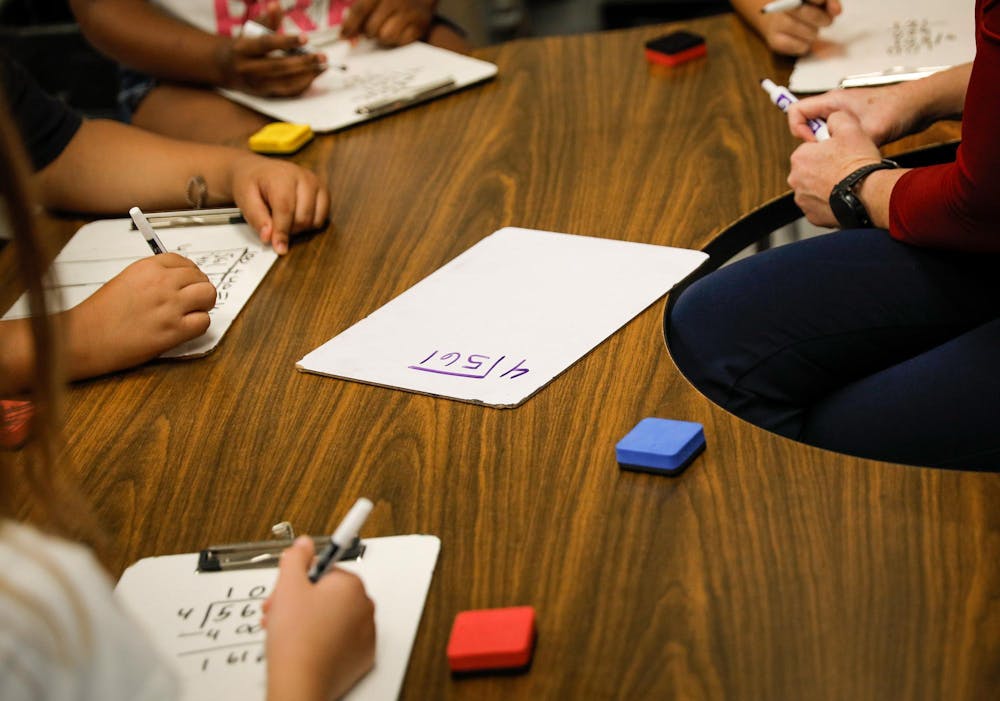With the upcoming election, many educators face various concerns regarding policies proposed by running politicians. According to the 2023 Annual Licensure Data Report, there are 235,467 teachers in the state of Indiana.
Many issues educators look for when deciding which candidates to vote for include school safety, reproductive rights and curriculum decisions.
Sam Knebel, a first-year English education major at Ball State University, said he hasn’t watched the election closely. However, he has major concerns and pays attention regarding gun laws with the new election.
Knebel wants “the kids to feel as safe as they physically can within a classroom environment,” emphasizing how important these laws can be when it comes to the student’s mental health.
He doesn’t want his future student’s safety, whether physically or mentally, to be put at risk along with his own. Knebel said he is there to teach because he loves it and he wants to have a positive impact in the classroom.
“I want to be the best teacher that I can be in the future . . . and [educators] are there because they love it,” Knebel said.
Jo Amich, a first-year social studies education major with a concentration in government at Ball State, follows politics mainly when it pertains to abortion and birth control regulations.
Amich said she also cares about education in the upcoming generation of children due to how it will affect the future workforce.
“I think that if we don’t have a good education system, especially when it comes to higher levels of education, we’re going to lose people in the workforce,” Amich said. “We’re not going to have doctors, lawyers and businessmen who can keep the economy a little more steady.”
Jasmine Roby, a first-year social studies education major at Ball State, said she does not follow politics closely, but she wants to ensure that her future students — and current students — remain safe within classrooms.
“If something happens, like a shooting, then how are students supposed to contact their parents to let them know they are OK?” Roby said, in regards to recent trends banning phones in schools across the country, including in Indiana.
She believes that there should be some form of gun laws “for safety” and has worries about guns in the classroom. She feels that if educators need them in the room for protection, then “[educators] should go through the same background checks as they would in the military.”
“The kids that are in elementary school [and] high school right now, they are the ones going to be voting in the future,” Amich said “[These students] are the ones that past generations are going to rely on as they get older.”
A large policy conversation that occurs in election seasons is the wages of educators and the funding of education. Knebel argues that a fair and livable wage for educators is a basic right.
“Educators are people too … They still want a wage because, at the end of the day, you still have to be able to live.” Knebel said. “[Educators] are not just teachers … [Teachers] have political views, but obviously, they should not be bringing that into the classroom and influencing kids.”
Amich emphasizes that educators “do so much work that they do not get paid for.”
One of Amich’s main issues with the education system is the wages that teachers and professors are making. She believes if there was an increase in wages there would also be an increase in teachers across schools.
For Roby, the importance of educators being able to freely share concerns, opinions and viewpoints is important, and they shouldn’t have to hide these ideas in fear of how it can impact their classroom.
“We’re people. Educators are people, they have feelings,” Roby said.
Contact Savana New via email at savana.new@bsu.edu.





